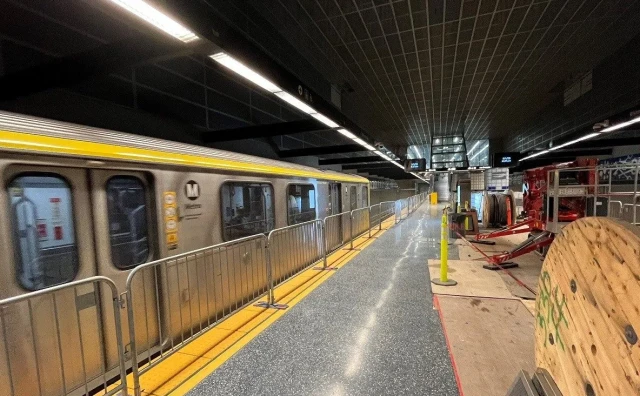With our free press under threat and federal funding for public media gone, your support matters more than ever. Help keep the LAist newsroom strong, become a monthly member or increase your support today during our fall member drive.
Ohio Budget Measure Aims To Curtail Some High-Speed Internet Access
RACHEL MARTIN, HOST:
We've come to rely on high-speed Internet for everything from online learning to streaming movies and running a business. In Ohio, some lawmakers are trying to prevent cities from securing faster broadband access for their residents. From Ideastream Public Media, Taylor Haggerty reports.
TAYLOR HAGGERTY, BYLINE: When the town of Fairlawn tried to attract a telecom company to set up affordable broadband service, no provider was interested in serving its 7,500 residents.
ERNIE STATEN: We really wanted to just bring this service to our residents, to our businesses, to make that happen. And they declined.
HAGGERTY: Ernie Staten, the city's director of public services, says Fairlawn decided to go it alone and offer its own broadband service.
STATEN: This is an important utility that we've put in. Our residents want it. Our businesses want it. We've served it to them.
HAGGERTY: For many, broadband is an essential utility, with residents and businesses relying on it the same way they are water, sewer and electric service. Now Republican Governor Mike DeWine wants to expand broadband funding by $250 million. But his party, which controls the state house, is expected to cut the funding possibly to zero. And an additional provision added anonymously to the Senate version of the state budget bill would further restrict communities like Fairlawn that offer their own broadband. Lieutenant Governor Jon Husted says the state has broadband projects lined up and ready to go. And the amendment is cause for concern.
JON HUSTED: When you take the money out and you say that you don't want any of the private-public partnerships to occur, it certainly makes one pause and wonder what the true motivation is here.
HAGGERTY: Motivation aside, Republican Senate President Matt Huffman says, for him, it's about competition.
MATT HUFFMAN: If they're using tax dollars to compete with the private sector, that's not what we want.
HAGGERTY: Sean Gonsalves is with the Institute for Local Self-Reliance. He says allowing municipalities to operate their own broadband programs brings lower costs and improves the quality of available broadband overall. He argues that proposed restrictions, likely crafted by telecom company lobbyists, aren't aiming to improve broadband.
SEAN GONSALVES: What these bills are designed to do is protect the regional monopolies that these incumbent mostly cable companies, but also telecom companies - they're looking to prevent any competition to their service whatsoever.
HAGGERTY: Gonsalves says while other states have put restrictions or outright bans on broadband access in the past, Ohio is the first to do so in about a decade. In fact, states like Arkansas and Washington are making it easier for cities to offer their own broadband. Amanda Woodrum with the think tank Policy Matters Ohio says the proposal in the Ohio Senate signals a preference for corporations over residents.
AMANDA WOODRUM: These are the communities hardest hit by the pandemic and COVID. And we should be focusing our investments into, essentially, areas of concentrated poverty, not pulling out the rug from underneath them.
HAGGERTY: Fairlawn's Ernie Staten sees a real benefit from his town's broadband improvements.
STATEN: The effects have been - they're just incredible, you know, the schooling, the job market. It's really grown the city. When you thought we were landlocked, if you will, we didn't see a lot of growth, it has really made a difference.
HAGGERTY: The Ohio House and Senate have until Wednesday to reconcile their budgets and determine whether broadband expansion programs will receive as much as $250 million in state funding or, possibly, none at all.
For NPR News, I'm Taylor Haggerty in Cleveland.
(SOUNDBITE OF FRAMEWORKS SONG, "SAND AND STONE") Transcript provided by NPR, Copyright NPR.
At LAist, we believe in journalism without censorship and the right of a free press to speak truth to those in power. Our hard-hitting watchdog reporting on local government, climate, and the ongoing housing and homelessness crisis is trustworthy, independent and freely accessible to everyone thanks to the support of readers like you.
But the game has changed: Congress voted to eliminate funding for public media across the country. Here at LAist that means a loss of $1.7 million in our budget every year. We want to assure you that despite growing threats to free press and free speech, LAist will remain a voice you know and trust. Speaking frankly, the amount of reader support we receive will help determine how strong of a newsroom we are going forward to cover the important news in our community.
We’re asking you to stand up for independent reporting that will not be silenced. With more individuals like you supporting this public service, we can continue to provide essential coverage for Southern Californians that you can’t find anywhere else. Become a monthly member today to help sustain this mission.
Thank you for your generous support and belief in the value of independent news.

-
Kevin Lacy has an obsession with documenting California’s forgotten and decaying places.
-
Restaurants share resources in the food hall in West Adams as Los Angeles reckons with increasing restaurant closures.
-
It will be the second national day of protest against President Donald Trump.
-
The university says the compact, as the Trump administration called it, could undermine free inquiry and academic excellence.
-
This is the one time you can do this legally!
-
Metro officials said it will be able to announce an opening date “soon.”







